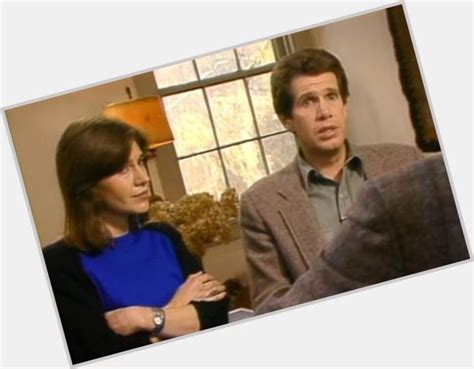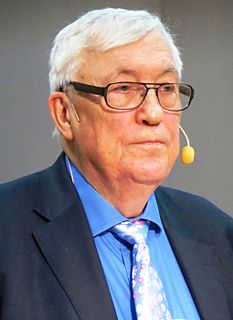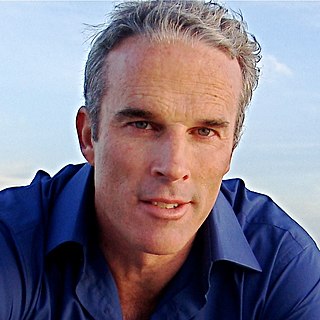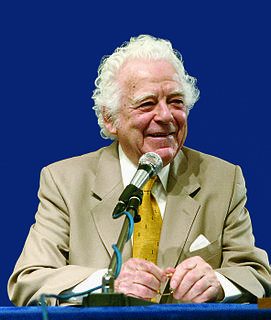A Quote by Norman Borlaug
I now say that the world has the technology - either available or well advanced in the research pipeline - to feed on a sustainable basis a population of 10 billion people. The more pertinent question today is whether farmers and ranchers will be permitted to use this new technology? While the affluent nations can certainly afford to adopt ultra low-risk positions, and pay more for food produced by the so-called "organic" methods, the one billion chronically undernourished people of the low income, food-deficit nations cannot.
Quote Topics
Adopt
Advanced
Affluent
Afford
Available
Basis
Billion
Cannot
Certainly
Deficit
Either
Farmers
Farmers And Ranchers
Feed
Food
Income
Low
Low Income
Methods
More
Nations
New
New Technology
Now
Organic
Pay
People
Permitted
Pertinent
Pipeline
Population
Positions
Produced
Question
Ranchers
Research
Risk
Say
So-Called
Sustainable
Technology
Today
Use
Well
Whether
While
Will
World
Related Quotes
Here are two facts that should not both be true:
- There is sufficient food produced in the world every year to feed every human being on the planet.
- Nearly 800 million people literally go hungry every day, with more than a third of the earth's population -- 2 billion men and women -- malnourished one way or another, according to the United Nations Food and Agriculture Organization.
I think the best and perhaps only sensible policy for the future is to prepare society for change and be prepared to adjust. In 25 years, we'll have a world with some 9 to 10 billion people that will require twice as much primary energy as today. We must embrace new science and technology in a more positive way than we presently do in Europe. This includes, for example, nuclear energy and genetic food production to provide the world what it urgently needs.
I always give the analogy of the Earth at Night picture, of 7.3 billion of us, right? And everyone says, "Well, that's population." Well, if you took the entire world's population and you lived at the density of Manhattan proper - not a bad place to live - how much space do 7.3 billion people take up? The state of Colorado. At which point I end my lectures, because I want you to be thinking ... is this really a question of population, or is this a question of land use and resource consumption? And let's face it, the top 1.3 billion of us are doing all the damage. Sorry.
Right now you're seeing more and more families reporting that they are skipping meals. They're having to give up meat. Mothers are foregoing food so their kids can have something. People are growing their own vegetables, not because they've gone organic, but because it's one of the few assured sources of food they have. For low-income Americans food is costly right now. The price of food has been going up, and wages haven't. This puts working Americans in a real bind. The fact that the mainstream media hasn't reported it doesn't mean that it's not happening.
To put it bluntly, we now need to reverse course. We need more highly skilled small farmers in more places all across America - not as a matter of nostalgia for the agrarian past but as a matter of national security. For nations that lose the ability to substantially feed themselves will find themselves as gravely compromised in their international dealings as nations that depend on foreign sources of oil presently do. But while there are alternatives to oil, there are no alternatives to food.
We need to realize that these industrial methods of farming have gotten us used to cheap food. The corollary of cheap food is low wages. What we need to do in an era when the price of food is going up is pay better wages. A living wage is an absolutely integral part of a modern food system, because you can't expect people to eat properly and eat in a sustainable way if you pay them nothing. In fact, it's cheap food that subsidized the exploitation of American workers for a very long time, and that's always been an aim of cheap food.
All communities, and low-income communities especially because of food insecurity and lack of access to healthy foods, need more farmers markets, need more community gardens and urban farms. It would be great if people living in communities had the tools and resources to grow food in their own backyard - community-based food systems.
Humanity must accept that the food, the raw materials, the energy, the scientific knowledge and so on, belongs to everybody, that it is given by Divine providence for all peoples, the rich nations and what are called the developing nations. No one has the right to corner the goods of the world as is done today, whether that be oil or food or any of the things that we think are so important.



































